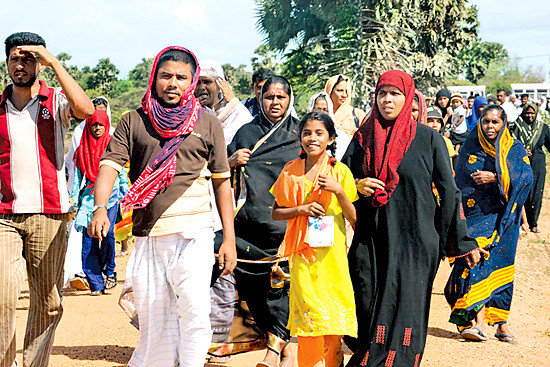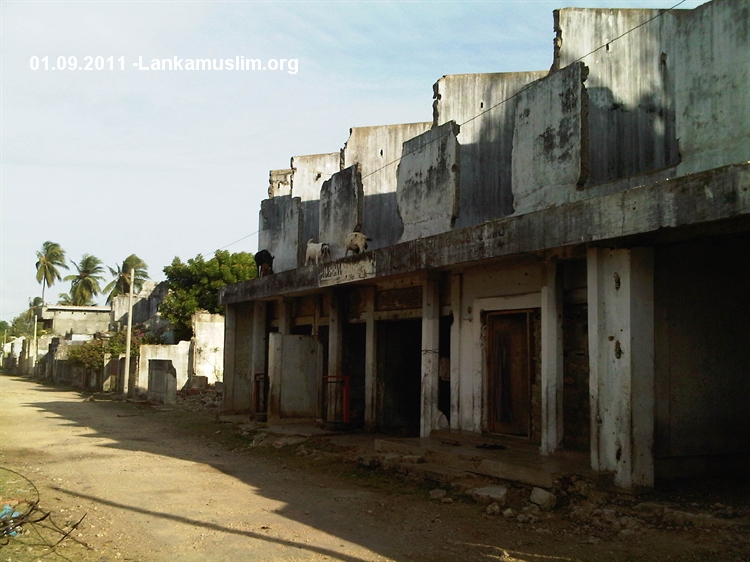25 years since the eviction of 75,000 Muslims by the Tamil Tigers from Sri Lanka’s North, the livelihood concerns of this marginalised section remain neglected. It is time for the political elite — both Sinhala and Tamil — to probe their own consciences and evolve a more inclusive resettlement framework
About 25 years ago, on October 30, 1990, the Tamil Tigers evicted the Muslims from the Sri Lanka’s Northern Province. A politically marginal population of about 75,000 people, constituting five per cent of the Northern Province, was subjected to ethnic cleansing with military precision; the Muslims were given between two and 48 hours to leave with just their clothes and a meagre 500 rupees.
Having lost all that that they owned, most of them languished in refugee camps in districts outside the North, mostly in Puttalam in Sri Lanka’s North Western Province. The end of the war in May 2009 brought some hopes for a return, but the absence of a resettlement policy, an unwelcoming Tamil bureaucracy and severed relations with the Tamil community have effectively crippled the process.
The return of the evicted Muslims was bound to be complicated. Historically, the largely Tamil-speaking Muslim community is characterised by not just a separate religious identity but also a separate ethno-cultural identity in Sri Lanka. The gulf between the Tamils and Muslims has further widened throughout the country over the last few decades following both the armed conflict and the formation of Muslim political parties.

Yearning for home
Consequent to their eviction in the North, an entire generation of Muslims was born and raised in refugee camps; the younger generation neither knew their homes nor could they count on the support of Tamil friends. What was once their home was now in ruins or occupied by displaced Tamils. Jobs and livelihoods had been disrupted for decades and Muslim schools were hardly functional. While some of the territory where their homes had been located, came under state control in the years following their eviction, fear kept most of the Muslim population away from the North. Shattered by the trauma of eviction and languishing in the squalor of camps for years, they yearned for a return home.
With the end of the war in late 2009, the displaced Muslim community made a concerted effort to return to their original homes in the North. However, families had grown, resulting in the fragmentation of their lands. In some parts of the North, Muslim politicians in the government exploited the situation of the returning population. The politics of patronage led to handouts for some, but the marginalised continued to suffer as they confronted what was a mockery in the name of resettlement. On the other hand, in places like Jaffna, the Muslim returnees were abandoned by both the Muslim and Tamil parties, and their attempts to return to their homes failed abysmally.
Unsympathetic state
In the Jaffna peninsula, over 2,000 families — out of the nearly 8,000 Muslim families originally from there — returned and registered for resettlement soon after the end of the war. However, only about 600 of them remain amidst immense social and economic difficulties. Mainly an urban community, the Jaffna Muslims lack even the most basic infrastructure, including water supply and drainage systems. Without a credible resettlement policy, there is little support from the state for these families to return. To make matters worse, hardly any Muslims in Jaffna were beneficiaries of the housing project sponsored by the Indian government, under which 50,000 houses were to be built for the war affected in the North. Indeed, there are strong allegations of an unsympathetic local Tamil bureaucracy blocking these grants.
“ It is when debates on reconciliation begin by addressing the sections of the society living on the margins — like the Jaffna Muslims, the Upcountry Tamils and the landless labourers — that solutions will be meaningful and long-lasting ”
In this context, the harrowing eviction of Muslims and its consequences on them are seldom discussed in Jaffna. While some Tamil opinion-makers in private provide circuitous justifications for the eviction, most say they were helpless in the face of the Tigers’ decision. Indeed, the eviction in October 1990 caught Jaffna by surprise — only a few Tamil individuals, mainly members of the clergy, dared to protest. The East had exploded months earlier with the Kattankudy and Eravur Mosque massacres, where more than 300 people were killed by the Tigers. Massacres and counter-massacres ensued in the following weeks, with the toll crossing a thousand deaths. But the North was considered different with good relations between the communities. Sadly, however, even in the absence of the Tigers today, most Jaffna Tamils remain indifferent, if not unwelcoming, toward the returning Muslim community. This social situation reflects weakened Tamil-Muslim relations and a Tamil public sphere where little has been done to rebuild them.

Remembering the eviction of the Northern Muslims is crucial today for forging a pluralistic future and rebuilding relations between communities. Following the recent overthrow of the Mahinda Rajapaksa regime, which thrived on polarising communities for its own consolidation of power, there is now a new push in Sri Lanka for reconciliation and for a political solution. Indeed, just a year ago, the Jaffna Muslim community lived under a cloud of fear as the Rajapaksa regime backed anti-Muslim attacks and pogroms persisted in southern Sri Lanka.
In this context, mainstream discourse reduces the country’s national question to one of solving the Sinhala-Tamil problem. International perceptions too limit the understanding of the political issue in Sri Lanka to simply an ethnic conflict between the two communities. But the political history of the country, its fissures and conflicts are far more layered and complicated. The challenge is to engage the social dynamics of class, caste, gender and, of course, ethnic differences, while not allowing the powerful singular framing of a Sinhala-Tamil conflict to over-determine the process of reconciliation.
It is when debates on reconciliation and a political solution begin by addressing the section of the society living on the margins that solutions will be meaningful and long-lasting. Just as the devastation during the conflict was the most severe for the marginalised, the political solution has to involve a prioritisation of solutions for the marginalised. Therefore, the concerns of the Jaffna Muslims, the fisher communities and the oppressed caste communities of the North; the issues faced by the Upcountry Tamils from the tea plantations and urban shanty dwellers in Colombo; and the difficulties encountered by the landless labourers in the North and South should be the starting point for a political solution and reconciliation.
Justice for fringes
Such grounded engagement would also be a check on any unreasonable demands for autonomy by the Jaffna Tamil elite; on the theatrics of the separatist Tamil diaspora and on the obsession of the Sinhala Buddhist nationalists with state sovereignty and national security. Here, Sri Lanka is fortunate to have a considerable body of work, one that includes proposals for devolution integrating the concerns of the marginalised minorities, such as the Upcountry Tamils in the estates. Such solutions go beyond mere legalistic concerns and territorial demarcations. As Sri Lanka launches a major push for a constitutional political solution this month, the humility of listening to the suffering of peoples like the Northern Muslims will be important.
The history of lost opportunities in Sri Lanka should be a warning against the hubris of experts and powerful political actors. Even at this late stage, there is a need for reconstruction and resettlement policies to be forged through the participation of local communities. The new government is likely to announce major plans for urban development, including those for towns like Jaffna. However, will the new urban development policies include the housing needs of the once-evicted Northern Muslims or will it drive them out of Jaffna?
The Northern Muslims’ call for remembering their tragic past is tied to their ongoing daily struggle for land, housing, education, jobs and livelihoods. Their future in places like Jaffna will depend on constitutional guarantees and resettlement policies as much as on probing the political conscience of the Tamils and rebuilding Tamil-Muslim relations.
And this, in turn, is linked intimately to how the state will respond to the serious social and economic concerns pervading the war-torn Northern Province. A political will on the part of those at the helm and the Tamil leadership can substantively address the problems of people in the Province, which has a population of just one million, amid challenges of envisioning an inclusive political solution. For the Tamil community, finding its lost political bearings requires a process of introspection that can begin by addressing the eviction and return of Northern Muslims.
Will the state and the Tamil and Muslim political parties and leaders, who have, for the most part overlooked the concerns of Northern Muslims, listen to them after 25 years?
(Ahilan Kadirgamar is a researcher and activist based in Jaffna.)
